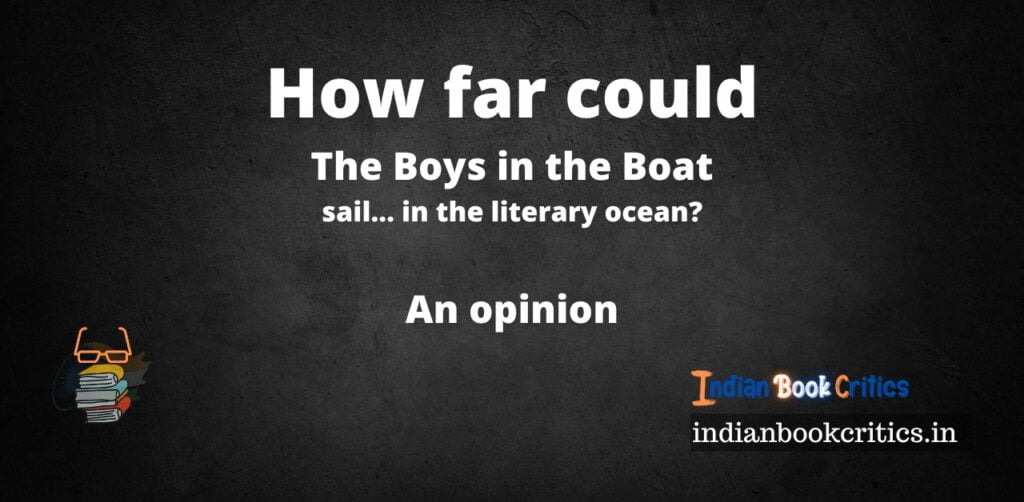Have you already read this novel? A bestselling work of fiction by noted novelist Daniel James Brown, The Boys in the Boat, tells the dramatic story of a rowing team that plucks the flower of victory… almost from the garden of Eden. However, how fair did the novel fare in navigating the literary waters? We will explore the same in this article – a critical evaluation of the novel, its flaws and much more. Stay tuned.
Before we get into the side that’s not bright, let’s appreciate the work because it deserves some. “The Boys in the Boat” by Daniel James Brown has become a beacon in the literary seascape, steering readers through a riveting narrative that intertwines sports, history, and human resilience. Since its launch, the book has enjoyed a considerable reception, hailed for its compelling storytelling and immersive depiction of the University of Washington’s rowing team’s journey to victory at the 1936 Berlin Olympics.
The Story Unveiled:
At the heart of the novel is the underdog tale of the rowing team, composed of working-class boys, who against the backdrop of the Great Depression, overcame seemingly insurmountable odds to clinch gold in Berlin. The narrative unfolds with cinematic precision, portraying the physical, mental, and emotional challenges faced by the rowers. Central to the story is Joe Rantz, a character whose personal journey takes a prominent role, becoming a focal point amid the broader team narrative.
Critical Acclaim and Reader Reception:
From its launch, “The Boys in the Boat” has enjoyed widespread acclaim, with readers praising Brown’s meticulous research and storytelling finesse. The novel has resonated with a diverse audience, appealing to both history enthusiasts and sports fans. However, the literary voyage has not been entirely smooth, as critics have raised certain concerns, sparking discussions about the novel’s merits and shortcomings.
The Critic’s Compass:
One of the main criticisms levelled at the novel is its predictability. Some argue that the well-trodden path of the underdog sports narrative, while delivering a triumphant tale, follows a formulaic trajectory, with the outcome for the rowing team becoming apparent early on. This predictability, critics contend, may diminish the narrative tension and surprise for those seeking a more unpredictable journey.
Another point of critique is the perceived lack of character depth. While Joe Rantz’s story is prominently featured, some critics argue that other team members appear one-dimensional, lacking the nuanced exploration that could have added more layers to the narrative. The emotional manipulation woven into moments of triumph or tragedy has also faced scrutiny, with some critics suggesting that the emotional highs and lows feel orchestrated, potentially diluting the authenticity of the emotional connection for readers.
The novel’s historical accuracy, while celebrated, has not escaped criticism. The intricate historical context, at times, overwhelms the reader with details, leading to concerns that the balance between historical exposition and personal storytelling may be skewed. Additionally, a few reviewers have pointed out inconsistencies in the tone, particularly in transitions between technical descriptions of rowing and broader historical expositions, disrupting the narrative flow for some readers.
So, is the novel worth reading?
Of course! Read it without a doubt! The novel is every inch a bestseller and rightfully so. It is the job of critics to highlight the flaws if a work of literature has it. However, no critic has dismissed the novel as such. With its limited flaws and predictability, the novel is an entertainer and that’s why the book has been on the New York Times Bestsellers’ list, and recently as well, even after 11 years of its publication. The novel does offer an emotional odyssey of a team with resilience and attitude.
Conclusion:
“The Boys in the Boat” has weathered both storms of praise and criticism since its launch. While critics have raised valid points about predictability, character depth, emotional manipulation, historical context overload, and inconsistencies in tone, it’s crucial to recognise the subjective nature of literary critique. For many readers, the novel’s overall storytelling prowess, vivid imagery, and celebration of teamwork outweigh these concerns, making it a compelling voyage through history’s waters. Ultimately, whether you navigate these literary seas appreciating the scenic view or scrutinising the map for hidden reefs depends on your personal reading compass.
Want a book review instead? Read it here: The Boys in the Boat by Daniel James Brown (a nicely written review by Thoughtful Critic)
Ashish for Indian Book Critics
*()*
